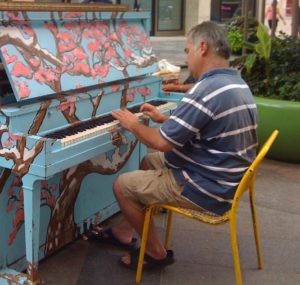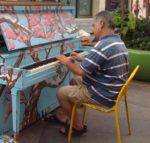Helping Adult Students Move On Part 1

The fall semester of lessons has begun here in Arizona. This year, I have quite a number of adult students in my studio. I love teaching grownups. Some are completely open about their goals and others quite shy about them. All of them are continuing music because they want to. They may be busy as anything with adult responsibilities but they are their own motivation.
Adult learners returning to piano study can be stuck in their perceptions at just about any point between the present and, say, third grade. If they were at an early level when they stopped lessons, they are often focused on rote thinking. One example is using Every Good Boy Does Fine and other mnemonics to match staff and keyboard locations. This results in obsessive writing of note names- occasionally accompanied by some pretty amazing grimaces. We work together to build multiple reading strategies including mnemonics, intervals, ear training, and landmark notes. We also do a lot of simple improvisation to experience and build flow of musical ideas and rhythms.
Adults who last took lessons as a young child also need help with relativity. “Forte means this loud. Piano means exactly this soft,” they say. There are dramatic demonstrations. But actually, dynamics are not exact decibel levels. So, we do a lot of listening to various genres with scores in front of us. “But, that’s not really loud and the accent wasn’t sharp,” they say. We discuss emphasis and meaning in our own speech and how it is relative to character and mood. We play excerpts of exercises and pieces and shape them within different characters. We play.
When you last viewed something as a child, it can be hard, even intimidating, to look at it from an adult perspective. It means you have to give up some small part of that person you once were. Addressing rote, fact based thinking and relativity in music markings can lessen an adult’s frustration (sometimes even panic) level and experience the joy of discovery.

